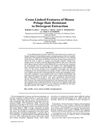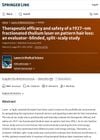 47 citations,
March 2016 in “Journal of dermatology”
47 citations,
March 2016 in “Journal of dermatology” Understanding the genetics of rare inherited ichthyosis syndromes is key for better treatments and genetic counseling.
[object Object] 328 citations,
November 2020 in “Nature Materials” Hydrogel scaffolds can help wounds heal better and grow hair.

Hair aging leads to color loss and reduced density, and dermatologists are key in treating it to improve quality of life.
1 citations,
April 2023 in “Scientific Reports” Self-assembling RADA16-I hydrogels with bioactive peptides significantly improve wound healing.
 15 citations,
February 1999 in “The anatomical record”
15 citations,
February 1999 in “The anatomical record” Some mutant mice have hair with abnormal cross-linking, mainly in the cuticle, not affecting other hair parts.
9 citations,
June 1999 in “Journal of Investigative Dermatology” The HPV type 11 region activates hair-specific gene expression in mice.
 4 citations,
November 2017 in “Scientific Reports”
4 citations,
November 2017 in “Scientific Reports” The research provides a gene-based framework for hair biology, highlighting the Hippo pathway's importance and suggesting links between hair disorders, cancer pathways, and the immune system.
 15 citations,
May 2019 in “PLOS ONE”
15 citations,
May 2019 in “PLOS ONE” Substances from dental stem cells might help treat hair loss.
 23 citations,
September 2017 in “The journal of investigative dermatology/Journal of investigative dermatology”
23 citations,
September 2017 in “The journal of investigative dermatology/Journal of investigative dermatology” NF-κB is crucial for different stages and types of hair growth in mice.
 21 citations,
January 2018 in “Lasers in Medical Science”
21 citations,
January 2018 in “Lasers in Medical Science” The 1927-nm fractionated thulium laser treatment significantly improves hair thickness and count in pattern hair loss patients.

Botulinum toxin type A significantly reduces scalp psoriasis severity compared to placebo.
 5 citations,
January 2023 in “International Journal of Molecular Sciences”
5 citations,
January 2023 in “International Journal of Molecular Sciences” Hair follicles could be used to noninvasively monitor our body's internal clock and help identify risks for related diseases.
 May 2009 in “Medical and surgical dermatology/Medical & surgical dermatology”
May 2009 in “Medical and surgical dermatology/Medical & surgical dermatology” Hair and nail conditions can stabilize or improve over time, and new treatments show promise.
 82 citations,
June 2020 in “Inflammation Research”
82 citations,
June 2020 in “Inflammation Research” Skin problems in COVID-19 patients are rare and may be due to the body's complex immune response or blood clotting issues.
 1 citations,
December 2011
1 citations,
December 2011 Marine-derived ingredients show potential for hair health but need more human trials to confirm effectiveness.
 3 citations,
June 2017 in “International Journal of Radiation Biology”
3 citations,
June 2017 in “International Journal of Radiation Biology” Gamma rays did not change hair follicle density but increased white and hypopigmented hairs in mice.
 April 2020 in “bioRxiv (Cold Spring Harbor Laboratory)”
April 2020 in “bioRxiv (Cold Spring Harbor Laboratory)” Skin healing from blisters can delay hair growth as stem cells focus on repairing skin over developing hair.
 38 citations,
August 2005 in “Veterinary dermatology”
38 citations,
August 2005 in “Veterinary dermatology” A disease causing skin issues in young adult German short-haired pointers is hereditary, with most affected dogs not responding to treatment.
 December 2023 in “The journal of cell biology/The Journal of cell biology”
December 2023 in “The journal of cell biology/The Journal of cell biology” The mTurq2-Col4a1 mouse model shows how the basement membrane develops in live mammals.
11 citations,
August 2021 in “Aging” Collagen and TGF-β2 help maintain hair cell shape and youthfulness.
 1 citations,
March 2021 in “Current Dermatology Reports”
1 citations,
March 2021 in “Current Dermatology Reports” Various treatments help hair growth, but more research needed for safety and effectiveness.
23 citations,
July 2020 in “Aging Cell” Aging changes sugar molecules on skin stem cells, which may affect their ability to repair skin.
 24 citations,
January 2020 in “International Journal of Molecular Sciences”
24 citations,
January 2020 in “International Journal of Molecular Sciences” Some plants with flavonoids may help treat hair loss and promote hair growth.
 10 citations,
October 2015 in “Medicina Clínica (english Edition)”
10 citations,
October 2015 in “Medicina Clínica (english Edition)” Recombinant human epidermal growth factor is versatile, effective, and safe for long-term skin and mucosal treatments.
 88 citations,
February 2011 in “Journal of Dermatological Science”
88 citations,
February 2011 in “Journal of Dermatological Science” Minoxidil helps hair growth by activating the β-catenin pathway.
135 citations,
October 1997 in “Journal of biological chemistry/The Journal of biological chemistry” Trichohyalin is modified by enzymes to form strong structures in hair cells.
 29 citations,
December 2019 in “Stem Cells Translational Medicine”
29 citations,
December 2019 in “Stem Cells Translational Medicine” Fully regenerating human hair follicles not yet achieved.
 January 2023 in “Frontiers in bioscience”
January 2023 in “Frontiers in bioscience” Artemis protein may help control hair growth and health by influencing cell processes.
[object Object]  84 citations,
April 2005 in “Dermatologic Clinics”
84 citations,
April 2005 in “Dermatologic Clinics” Treatments for melanin disorders exist, but more effective options needed.
 4 citations,
November 2015 in “Journal of Investigative Dermatology”
4 citations,
November 2015 in “Journal of Investigative Dermatology” Testosterone may worsen hair loss by affecting hair growth signals, while different prostaglandins can either hinder or promote hair growth.
























